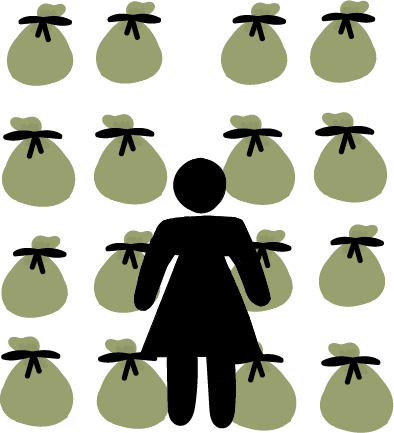Reduce, Reuse, Recycle
Northwest representatives speak about recycling
February 1, 2023

Each trash bag below represents 100 pounds of the trash generated by the average student. Together, NW students generate 2.6 million lbs. of trash annually
Earth First and other clubs have recently been pushing for students to put what belongs in each waste group in their respective bins at lunch. School administrators such as associate principal Britton Haney have also been striving for students to do the same.
“I think anybody planning to keep the earth in the best shape possible for the next 50 years should be recycling every day,” associate principal Britton Haney said. “We have recycling bins set up, but I don’t think, as a community, we do a solid job making sure we put our stuff in the right spot.”
There has never been a huge push to recycle by administrators, so many students feel as if they don’t have to do it.
“I don’t think people care that much ,” senior Rohan Shroff said. “I think the recycling bins are also usually pretty empty. It doesn’t really seem like the school or the students take recycling as seriously as they maybe should.”
According the Republic Services, 50.8% of the average school waste stream is organics. That applies to waste that should go to composting. The next largest percentage is paper waste, at 31.4%. The third largest percentage is plastic, which is 12.7%.
After the waste is collected, it is taken to the Johnson County/WM Recycling Center where it is emptied either by hand or material. Once the waste is sorted, clean recyclables and soiled will be sorted into two different piles. If the recyclables were contaminated before coming to the recycling center, it will be immediately grouped with landfill. The clean recyclables are sold to businesses, manufacturers and other organizations so they can be reused.
“It’s very important that we recycle, and that the school recycles,” senior Bryson Mischlich said. “Even though our trash is very miniscule to all the world’s trash, if everyone in the world is doing it than it’s not just miniscule anymore.”
Of the 95% of Americans who say they recycle, 25% of them recycle “some of the time.” Fewer than half of them know the basics of recycling, according to the 2021 Consumer Recycling Habits survey by the Paper and Packaging Board which is overseen by the United States Department of Agriculture.
“I understand everyone wants to just throw their stuff away and move on to the next thing they’re doing,” senior Erin Moody said. “Even I don’t know are supposed to go where, but I wish we did a better job at helping kids know where stuff goes.”
Poor recycling quality is usually due to a lack of education. Most people know that recycling is a good habit for the environment, but are often unsure of what goes into the recycling bin which can lead to consumers turning to the trash bin in defeat, according to the University of Colorado at Boulder.
“Make sure that you actually ,” Moody said. “There’s recycling bins in every classroom, even if hasn’t told you. You can go out of your way and recycle. You don’t have to be told to do it.”